
Marilyn Jeanne Seely is an American singer, songwriter, record producer, actress and author. Primarily identified with country music, Seely found success with the Grammy Award-winning song "Don't Touch Me" (1966). Her soul-inspired vocal delivery gave her the nickname of "Miss Country Soul". Seely has been a member of and performer on the Grand Ole Opry, having appeared more times on the program than any other performer.
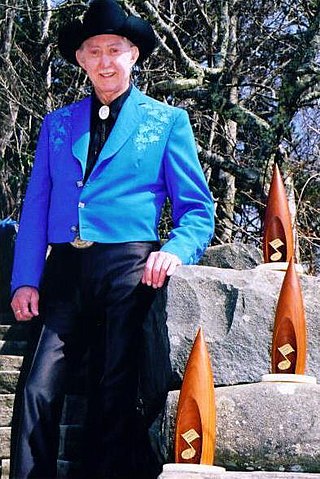
Jack Henry Greene was an American country musician. Nicknamed the "Jolly Greene Giant" due to his height and deep voice, Greene was a long time member of the Grand Ole Opry. A three-time Grammy Award nominee, Greene is best known for his 1966 hit, "There Goes My Everything". The song dominated the country music charts for nearly two months in 1967 and earned Greene "Male Vocalist of the Year", "Single of the Year", "Album of the Year" and "Song of the Year" honors from the Country Music Association. Greene had a total of five No. 1 country hits and three others that reached the top ten. Billboard magazine named Greene one of the Top 100 "Most Played Artists".
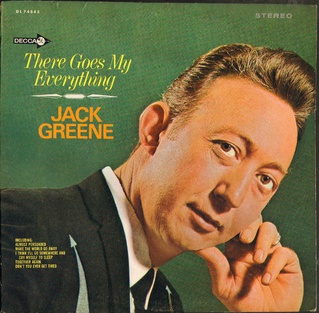
There Goes My Everything is a studio album by American country music artist Jack Greene. It was released in December 1966 on Decca Records and was produced by Owen Bradley. It was Greene's debut studio album as a recording artist after playing in the band of Ernest Tubb for several years. Three singles were included in the album. Its biggest hit was the title track, which topped the country charts in 1966 and helped jump start Greene's music career. The album itself would also reach peak positions on the Billboard country chart following its release.

The discography of American country artist Jan Howard contains 17 studio albums, six compilation albums, 51 singles, one box set, two other charted songs and 12 additional album appearances. Her recordings were issued as singles beginning in 1958. The first to chart was issued by Challenge Records called "The One You Slip Around With". Released in 1959, it rose into the US Hot Country Songs top 20. It was followed by two duets with Wynn Stewart, including the chart record "Wrong Company". Howard's debut studio album, Sweet and Sentimental, featured dual credit with The Jordanaires and was issued by Capitol Records in 1962. In 1963, "I Wish I Was a Single Girl Again" reached the top 30 of the US country songs chart.

The discography of American country artist Jeannie Seely contains 17 studio albums, four compilation albums, one soundtrack album, four music videos, 17 album appearances and 36 singles. Her first singles were for the Challenge label before 1966's "Don't Touch Me". The latter reached number two on the US Billboard Hot Country Singles chart and her only single to reach the Billboard Hot 100, peaking at number 85. The song was included on her debut studio album titled The Seely Style (1966), which reached number eight on the US Billboard Top Country Albums chart.

"It's Only Love" is a song written by Hank Cochran that was originally recorded by American country artist Jeannie Seely. It was released by Monument Records as a single in September 1966, rising to the US country songs top 20. It was given positive reviews from music publications following its release and was included on her debut studio album The Seely Style.

"A Wanderin' Man" is a song written by Hank Cochran that was originally recorded by American country artist Jeannie Seely. Released as a single by Monument Records, it reached the top 20 of the US country songs chart in 1967. It was Seely's third top 20 single in her career and was given positive reviews from music magazines following its release. It appeared on her second studio album called Thanks, Hank!.

"Can I Sleep in Your Arms" is a song written by Hank Cochran that was originally recorded by American country artist Jeannie Seely. Released as a single in 1973, it placed in the top ten of the US and Canadian country song charts. It also served as the title track to her 1973 studio album. The song became Seely's first top ten country single in several years and her final top ten release as well. The song was adapted from a hobo tune and a folk standard. It received reviews from several publications following its release.
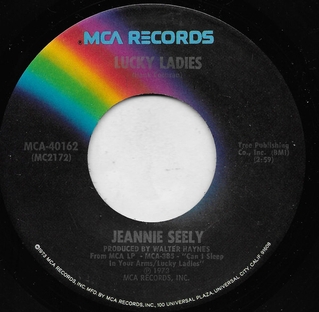
"Lucky Ladies" is a song written by Hank Cochran that was originally recorded by American country artist Jeannie Seely. Released as a single by MCA Records, it placed in the top 20 on both the US and Canadian country charts in 1974. The song was adapted from the song "Come All You Fair and Tender Ladies" and received reviews from music magazines following its release. It was the second single spawned from Seely's studio album Can I Sleep in Your Arms/Lucky Ladies.

Count Your Blessings, Woman is a studio album by American country music artist Jan Howard. It was released in June 1968 via Decca Records and contained 11 tracks. Many of the album's tracks were cover tunes with the exception of the title track. Released as a single, the title track was a top 20 US country song and a top ten Canadian country song. The album itself made the top 30 of the US country survey. Howard's vocal performance was praised in reviews by Billboard and Cash Box magazines.
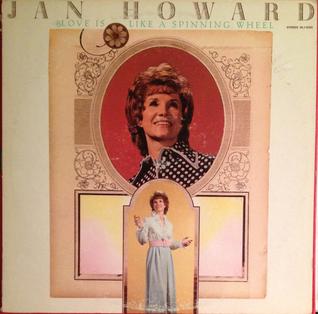
Love Is Like a Spinning Wheel is a studio album by American country artist Jan Howard. It was released by Decca Records in March 1972 and was her twelfth studio album. The project contained 11 tracks, which were a mixture of new songs and cover tunes. Among its tracks were two singles: "Let Him Have It" and the title track. The latter was a top 40 US country song and a top 20 Canadian country song. The album itself made the top 40 of the US country albums chart. The project was given reviews from Billboard and Cash Box magazines.
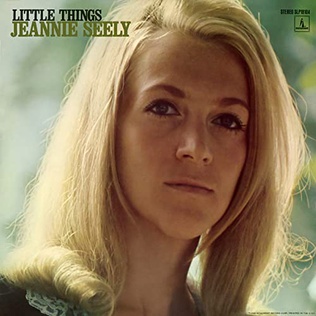
Little Things is a studio album by American country artist Jeannie Seely. It was released in December 1968, by Monument Records and was co-produced by Fred Foster and Jim Malloy. The record was Seely's fourth studio album released in her career and included three singles issued prior to the LP: "Welcome Home to Nothing", "How Is He?" and the title track. Little Things placed inside the top 40 on the US country albums chart and received reviews from both Billboard and Cash Box magazines.
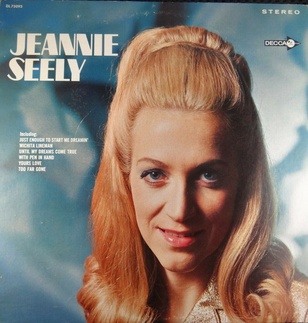
Jeannie Seely is an eponymous studio album by American country artist Jeannie Seely. It was released by Decca Records in April 1969 and was her fifth studio album. The 11-track collection featured songs written by Hank Cochran and others. Many of the songs were cover tunes, with some exceptions such as "Just Enough to Start Me Dreamin'". The latter was the album's only single and made an appearance on the US country chart in 1969. The eponymous release was Seely's first for the Decca label and received reviews from Billboard, Cash Box and Record World magazines.

"Wish I Didn't Have to Miss You" is a song written by Hank Cochran and Dave Kirby. It was originally and released as a duet by American country music artists Jack Greene and Jeannie Seely. Released as a single in October 1969, the song became a number two song on the US country chart in early 1970. The song was given positive reviews from Billboard and Cash Box magazines and would influence the making of their debut studio album in 1970.
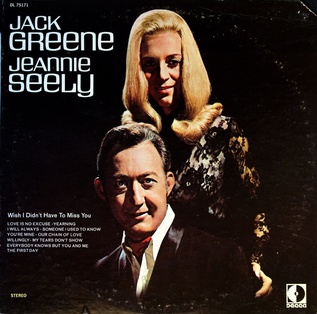
Jack Greene, Jeannie Seely is a studio album by American country music artists Jack Greene and Jeannie Seely. It was released by Decca Records in January 1970 and contained 11 tracks of mostly cover tunes. Although already both having two separate successful country recording careers, Greene and Seely teamed up to record an album of duets following the success of their single "Wish I Didn't Have to Miss You", which is also included. The LP received positive reviews from Billboard, Cash Box and Record World magazines.
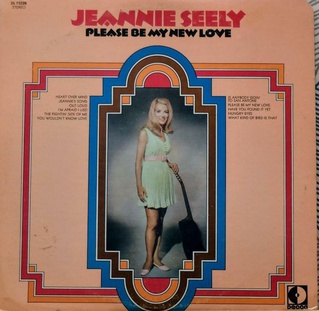
Please Be My New Love is a studio album by American country artist Jeannie Seely. It was released by Decca Records in July 1970 and was the seventh studio album in her career. The record consisted of 11 tracks, including a medley of cover tunes called "Jeannie's Medley". The latter tune and the title track were both released as singles originally. Please Be My New Love was given positive reviews by Billboard and Cash Box magazines.

Two for the Show is a studio album by American country music artists Jack Greene and Jeannie Seely. It was released in January 1973, by Decca Records. It was pair's second studio album as a duet team. The album included two singles that reached the US and Canadian country songs top 20 between 1971 and 1973: "Much Oblige" and "What in the World Has Gone Wrong with Our Love". The latter was co-written by Hank Cochran, who contributed to four additional tracks on the album. Two for the Show also made the US country albums top 40.

"What in the World Has Gone Wrong with Our Love" is a song written by Hank Cochran and Johnny Slate. It was recorded as a duet by American country music artists Jack Greene and Jeannie Seely. It was released as a single by Decca Records in 1972, rising into the top 20 on both the US and Canadian country songs charts. It was the third and final single to make a chart appearance by the duo.

Can I Sleep in Your Arms/Lucky Ladies is a studio album by American country artist Jeannie Seely. It was released by MCA Records in November 1973 and was her ninth studio project. It consisted of 11 tracks, four of which were written by songwriter Hank Cochran. Among the tracks were six songs originally released as singles: "Tell Me Again", "Alright I'll Sign the Papers", "Pride", "Farm in Pennsyltucky", "Can I Sleep in Your Arms" and "Lucky Ladies". Its highest-charting singles were the latter two releases, reaching the US country top ten and top 20 respectively. The album itself made the top 20 of the US country chart during the same period. The project received reviews from music publications following its original release.

The discography of American country artist Jack Greene contains 24 studio albums, one live album, four compilation albums, 40 singles and five other charted songs. He gained national attention as a drummer and background vocalist in Ernest Tubb's band. He soon signed a recording contract with Decca Records. Greene's second single, "Ever Since My Baby Went Away", became his first song to chart, reaching number 37 on the Billboard Hot Country Singles chart. Greene's next single, "There Goes My Everything", reached number 1 on the Billboard country chart in December 1966. Becoming his biggest hit, the song also was his only single to reach the Billboard Hot 100, peaking at number 65.




















